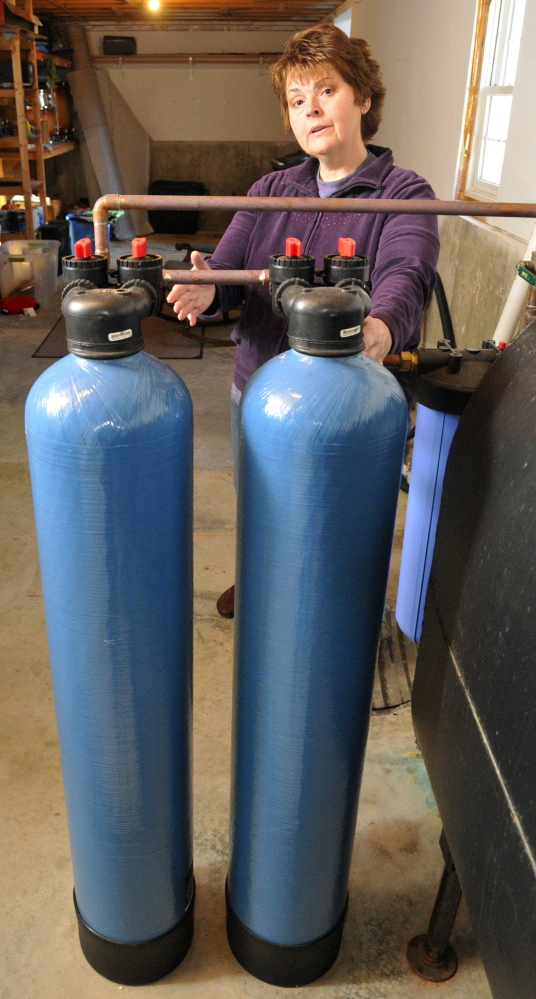AUGUSTA — After a study linking high arsenic levels in drinking water to lower IQ levels in central Maine children, the Legislature will consider measures that could fund well testing and remediation for some families.
Arsenic, a carcinogen occurring naturally in much of Maine’s bedrock, is a particular problem in parts of central and Down East Maine. Statewide, 150,000 people could be drinking from wells with high concentrations of it, according to a Dartmouth University study.
Kennebec County is especially affected. Twenty-nine percent of private wells in the county tested by the state between 2005 and 2009 had higher concentrations than the federal arsenic standard for public drinking water. That was a larger share of wells than in any other Maine county. In Manchester and Readfield, 62 percent and 49 percent of wells registered above the limit, respectively.
This year, Sen. Tom Saviello, R-Wilton, and Rep. Drew Gattine, D-Westbrook, are sponsoring bills on the subject.
The bills haven’t been released yet, but Gattine said his would mandate testing of wells before a home sale and if a well is drilled or expanded, also requiring well testers to pay fees to be used by the state to fund education programs and possibly remediation for low-income Mainers.
Saviello’s bill wouldn’t mandate testing, but he said it would encourage more strongly it before home sales and establish a fund — perhaps within the Maine State Housing Authority or through fees — to pay for low-income testing and remediation.
The funding focus is welcomed by Andrea Brann, of Manchester, who paid $3,300 for a system that treats water coming into her home and said she has met many people who can’t afford testing.
“Clean, safe drinking water shouldn’t have to be put into the list of what your priorities should be or have to be,” she said.
Arsenic gained more attention in Maine after a five-year study of 272 students in grades 3 through 5 at schools in Manchester, Readfield, Monmouth, Wayne, Mount Vernon and Hallowell was released last year by Columbia University and the University of New Hampshire. It found that exposure to even low levels of arsenic in water could lower IQ levels by as many as six points on a test.
After that, advocates called for a strong state response to the problem. The Maine Department of Health and Human Services recommends testing wells for arsenic and other contaminants every three to five years, which can cost $70 to $100. Remediation can cost hundreds or thousands of dollars, depending on whether homeowners decide to treat all water or just certain faucets.
Between 2004 and 2012, state surveys show that the share of homeowners knowing whether their wells had been tested for arsenic rose from 26 percent to 45 percent. Kennebec County was at 60 percent. Still, Mike Belliveau, executive director of the Environmental Health Strategy Center, a environmental group that helped draft Gattine’s bill, said “progress is too slow.”
However, some bill provisions could see opposition. In 2007, a bill that would have mandated well testing before a home could be sold failed before a legislative committee amid opposition from real estate agents, who said they already encourage buyers to test wells. That bill was modeled on a 2002 law in New Jersey that was the first of its kind in America.
Maine State Geologist Robert Marvinney declined to state a position on the bills, but he said “discussing the need to find ways to encourage people to test is good and it’s a discussion we need to have.”
Saviello, who represents some Kennebec County towns that were part of the study, said he has paid for some constituents to have their wells tested. He said many with arsenic in their wells are poor or first-time homeowners who could have trouble paying for upgrades. Belliveau said he’s encouraged by the bipartisan support for addressing arsenic in water.
“I think we can make progress here in a way that benefits rural Mainers and is practical and affordable,” he said.
Michael Shepherd — 370-7652
Twitter: @mikeshepherdme
Send questions/comments to the editors.





Success. Please wait for the page to reload. If the page does not reload within 5 seconds, please refresh the page.
Enter your email and password to access comments.
Hi, to comment on stories you must . This profile is in addition to your subscription and website login.
Already have a commenting profile? .
Invalid username/password.
Please check your email to confirm and complete your registration.
Only subscribers are eligible to post comments. Please subscribe or login first for digital access. Here’s why.
Use the form below to reset your password. When you've submitted your account email, we will send an email with a reset code.